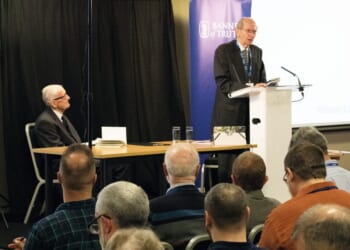“Marriage is a business deal, and it always has been,” Lucy, a professional matchmaker, tells her clients in the film Materialists. Inspired by director Celine Song’s six-month stint as a Manhattan-based matchmaker, the film acknowledges the transactional nature of romantic relationships but also poses the perennial question of whether true love is still achievable in a world where we increasingly pre-select potential partners based on their financial assets and physical attractiveness.
When we first meet Lucy (Dakota Johnson), she is attending the marriage of one of her clients. We soon learn that Lucy is the proverbial shoemaker whose children have no shoes. While she has arranged nine matches which have resulted in marriage, her own romantic life is non-existent, and she is convinced that she will “die alone.”
Who is the better partner, the person who checks all the boxes or the one who tugs at your heartstrings?
Seated at the singles table, she meets Harry, the groom’s brother (Pedro Pascal), an attractive, well-to-do hedge fund manager. Although Lucy sees Harry as a potential client, he sees her as a potential date. Interestingly enough, while Lucy and Harry are getting to know each other, she runs into her former boyfriend John (Chris Evans), an actor who is currently working the wedding as a waiter. Lucy broke up with John because of his financial instability. The audience quickly realizes that we have entered into not only Lucy’s personal romantic triangle but also the film’s essential question. Who is the better partner, the person who checks all the boxes or the one who tugs at your heartstrings?
Materialists is an interesting film in that it blends the genres of social commentary, romantic comedy, and cautionary tale. Song provides an intimate look at the dynamics of Manhattan’s high-end matchmaking industry, where men and women are willing to pay matchmakers like Lucy and her boss, Violet (Marin Ireland), large commissions to find a match who is the perfect mix of physical attractiveness, wealth, education, and political alignment.
The film includes several authentic scenes where the clients discuss their expectations for their match. Not surprisingly, the men depicted tend to be hyper-focused on the woman’s age and fitness, with men in their late 40s declaring a 39-year-old woman too old. Although the women portrayed are more forgiving of a man’s appearance, they are less willing to compromise on the man’s income. Dakota Johnson’s sweet voice and deadpan manner further enhance the verisimilitude of these conversations, such as when she bluntly tells a female client who presented her with a detailed wish list that she isn’t Dr. Frankenstein and consequently cannot build a man for her.
The film functions as a romantic comedy because we witness Lucy’s blossoming relationship with Harry. We also experience through contemporary dialogue and flashbacks the passionate connection that she still has with John. And as we watch her interacting with them both, we recognize that she is having difficulty deciding which man is her soul mate. What makes the film even more realistic is that when Lucy becomes embroiled in her own romantic situation, she loses her ability to provide her clients with objective, clear-headed advice.
Song examines the match-making industry with a critical but sympathetic lens. After all, the practice and business of brokering marriage arrangements have been in existence for centuries. Many happy couples were introduced through a common acquaintance, a professional matchmaker, or a match-making application. Unfortunately, all of these scenarios, even the common acquaintance, still carry risks, as it is difficult to fully vet anyone’s character or predict their behavior in intimate circumstances. While Materialists celebrates matchmaking as a vehicle for finding a partner, it also reinforces the importance of practicing personal safety.
The casting of Dakota Johnson was an inspired choice. At 35, the daughter of Don Johnson (Miami Vice) and Melanie Griffith (Working Girl ), and the granddaughter of Tippi Hedren ( The Birds), has truly come into her own as an actress. She infuses Lucy with a mélange of reserve, vulnerability, and hopefulness. Materialists is her best on-screen performance to date. Her physical beauty has also evolved. Her quiet elegance, which is reminiscent of the models of the 1960s, is a departure from the patrician beauty of her grandmother and the sexy baby-voiced prettiness of her mother. The other members of the cast, including Pascal, Evans, Ireland, and Zoe Winters, also deliver first-rate performances.
Materialists is a well-conceived, entertaining exploration of the contemporary matchmaking industry and the age-old question of what constitutes the right mix of love, security, and companionship. Moreover, it is also a reminder that although social mores may have changed and the forums for personal introductions may have expanded, the desire for a perfect match remains ubiquitous.
READ MORE from Leonora Cravotta:






![Florida Man With Violent History Arrested for Choking a Cop [WATCH]](https://www.right2024.com/wp-content/uploads/2025/06/Eleven-Stabbed-in-Attack-at-Salem-Homeless-Shelter-Across-From-350x250.jpg)








